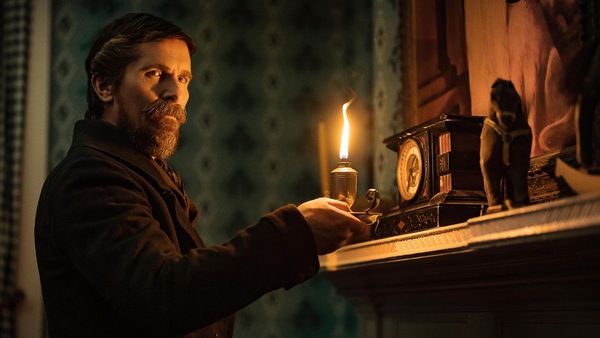Newsletter: The Pale Blue Eye Gives Edgar Allan Poe An Origin Tale
This is #CineFile, where our critic Rahul Desai goes beyond the obvious takes, to dissect movies and shows that are in the news. Here: The Pale Blue Eye.

Last Updated: 10.41 PM, Jan 18, 2023
This column was originally published as part of our newsletter The Daily Show on January 10 2023. Subscribe here. (We're awesome about not spamming your inbox!)
***
A GRIEVING DETECTIVE comes out of retirement to tackle a macabre new case. He is a widower, and his only daughter went absconding a few years ago. His fondness for alcohol – the spirit that numbs his pain – precedes him. But an incident at the United States Military Academy needs his expertise; a young cadet is found hanging, but more notably, his heart was carved out at the morgue. This is no suicide. More deaths follow. Slowly but steadily, the investigation brings our haunted detective back from the dead. Until it doesn’t.
That’s the thing about a Christian Bale performance. It reveals and conceals at once. You see themes like pain, love and rage take on mammoth but intangible form; he channels these in a way that presents the psychological as the physical, the mind as the soul. In Scott Cooper’s The Pale Blue Eye – a screen adaptation of Louis Bayard’s 2003 novel of the same name – Bale’s loftily-named Augustus Landor is an 1830s New York detective who’s a hybrid of the actor’s The Prestige and Hostiles characters. He is broken, but oozes purpose. The pieces aren’t designed to add up.
Bale, though, plays Landor with an added responsibility – as the inspiration and foundation of a legendary literary career. Landor is not alone after all; he enlists the help of a young cadet named Edgar Allan Poe (The Queen’s Gambit’s Harry Melling), an oddball and hyper-intelligent poet at odds with the violent masculinity of the setting. Poe is sensitive and quirky, and gravitates towards the gruff detective who feels protective of the ‘different’ boy.
THE FUTURE INVENTOR of the detective-fiction genre, EA Poe, is like the novice in a buddy-cop dramedy here. He’s full of unpolished sparkle and theories, but also a cold stray finding a warm home. The two men seem to complete one another; Landor is aloof to everyone but Poe, and Poe is annoying to everyone but Landor. The plot of the murder mystery is average at best, culminating in a twist that’s more awkward than attractive. The casting is smart. Usually, the presence of a popular actor in a small role tends to become either a red herring or a blatant giveaway in such movies. But Cooper casts a bunch of famous actors here – all capable of leading their own murder mystery – so that there’s a sense of uniformity in its deception. There’s Timothy Spall, Toby Jones, Robert Duvall, Charlotte Gainsbourg, even Gillian Anderson, all playing townspeople who could be suspects in their own right. Some are cops, some doctors and some murky family members. So there’s no question of being distracted by the faces.
But the premise is not really the point of this over-atmospheric whodunit. The Pale Blue Eye creates the illusion that its events are a crucial moment in American history. The bond between Landor and Poe – where Landor sees the child he lost in Poe and Poe sees the parents he never had in Landor – determines the destiny of a person who would go on to become one of the world’s most famous and acclaimed writers. Cooper taps into the heart of Bayard’s reimagination of Poe’s (real) time as a failed cadet. If you scratch beyond the surface, you might actually sense the crossroads. Poe is on the verge of getting inextricably attached to Landor, of embracing him as the family he sorely needs. But if he does, he might not go on to become the troubled artist that he was, and the world would be denied his complicated genius. An entire genre of writing would never be born, as it were. In a parallel universe, even this novel and film would not exist then. You wouldn’t be reading this piece either.
As a result, a lot seems to depend on the way this film pans out. Landor’s journey is crucial for reasons beyond the plot. His investigation has a dual cross to bear: of teaching Poe his craft as well as being the formative person who inadvertently sets Poe on the path to immortality. The irony, of course, is that Landor must figuratively ‘tear Poe’s heart out’ to achieve this. Poe needs to have an experience that breaks him, that pushes him away before it’s too late. He needs to be scarred by people who inspire him to turn his pain into literary gold. There’s a mysterious girl; there’s infatuation; but there’s also Landor himself, the only human who accepts Poe for who he is. Landor is the only one who has the power to change Poe.
In that context alone, The Pale Blue Eye is intuitive and poignant. The execution isn’t great – like the ‘revelation’ scene where even Harry Melling’s scene-stealing performance as Poe loses shape – but it’s the hopelessly romantic meaning that keeps the film afloat. It’s what we don’t see that lends gravitas to what we see. There are consequences to this saga, most of which we are still appreciating to this day. It’s all very moving at a wider level, because only a micro tragedy can trigger the macro happily ever after. Only sadness can shape the future of storytelling.
